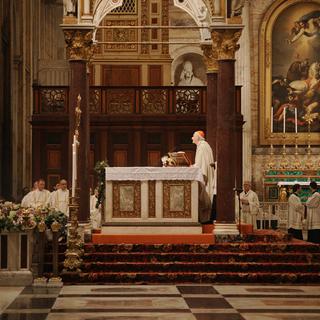


The Vatican's influential apostles of peace
InvestigationWielding a powerful diplomatic apparatus, Pope Francis is closely involved in world affairs, with priorities that include re-establishing dialogue between warring parties in Gaza and Ukraine.
The yellow-and-white flag stamped with the seal of the Holy See, with the keys to the kingdom of heaven given by Jesus Christ to Saint Peter, flew over the blue cabin. On this particularly sunny morning in April 2023, the plane from the Italian national airline ITA Airways, used by the pope for his international travels, had just landed at Budapest airport. On the runway, an official delegation was waiting for Francis to disembark on a special lift platform. The pontiff, who suffers from knee pain, is now virtually wheelchair-bound. A few minutes later, the head of the Catholic Church received military honors in the square adjacent to Sandor Palace, the Hungarian presidency's official residence. After greeting then-president Katalin Novák, who was seated next to him during the ceremony, he spent 20 long minutes talking to Prime Minister Viktor Orbán.
The pope may be the spiritual leader of over 1.3 billion Catholics worldwide – 2.9 million of them in Hungary – but he hadn't come to talk about religion. Of course, there would be a mass in the imposing Kossuth Square at the end of the trip, as there always is. But the trip had another purpose: Francis was here to talk about war and peace. He had come to share his vision of the conflict in Ukraine with Orbán, a leader with authoritarian tendencies close to Moscow.
The two men, who have long been at odds, particularly over the issue of migrants – who Francis defends but Orbán does not want on his territory – have one thing in common. For different reasons, and in opposition to most Western countries, they hold the same discourse on the need for an immediate ceasefire and the opening of negotiations between Russia and Ukraine.
'How many divisions does the Pope have?'
The Vatican, a microscopic 44-hectare state nestled in the heart of Rome, and its elected ruler, Pope Francis, do not simply administer the religious life of Catholics − they also intend to participate in world affairs. To this end, the pontiff is banking on the expertise of an army of Roman-collared diplomats who are busy behind the scenes. Addressing Winston Churchill, who asked him to listen to requests from the Holy See at the end of the Second World War, Joseph Stalin gave this now-famous response: "How many divisions does the Pope have?"
After losing its territories in central Italy in the wake of the country's unification in the second half of the 19th century, the Holy See, bereft of army, economic power and population, retains just one of the attributes of statehood: Diplomacy, which it used to mediate between great powers. "Even after the fall of the temporal power of the popes as sovereigns of Rome and the Papal States, the Holy See managed to remain an interlocutor for the countries that called on it for its role as arbiter," explained Roberto Regoli, a professor at the Pontifical Gregorian University in Rome.
You have 88.17% of this article left to read. The rest is for subscribers only.
